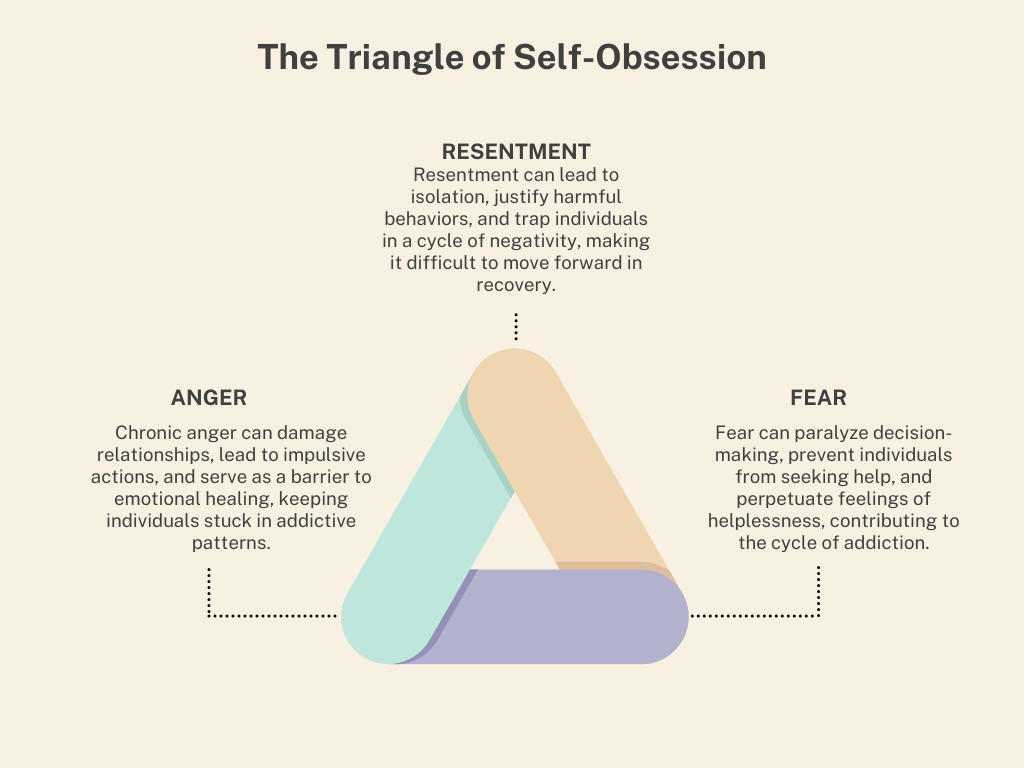Self-obsession is a pervasive issue that can significantly impact one’s mental health and overall well-being. It often manifests as a preoccupation with oneself, leading to unhealthy behaviors and thought patterns. To better understand and address this issue, it’s helpful to explore the concept of the “Triangle of Self-Obsession.” This model provides insight into how self-obsession develops and how it can be managed. In this blog, we’ll delve into the components of this triangle and discuss strategies for overcoming self-obsession.

What is the Triangle of Self-Obsession?
The Triangle of Self-Obsession is a conceptual framework that illustrates the interplay between three key elements: Self-Criticism, Self-Absorption, and Self-Destructive Behavior. These components interact to create a cycle that reinforces and perpetuates self-obsession. Understanding each of these elements is crucial for breaking the cycle and fostering healthier self-perceptions.
1. Self-Criticism
Definition and Impact
Self-criticism involves a harsh and negative evaluation of oneself. It often includes thoughts such as “I’m not good enough,” “I always mess things up,” or “I’m a failure.” This critical self-talk can erode self-esteem and contribute to a persistent sense of inadequacy.
How It Fits into the Triangle
Self-criticism is often the starting point of the Triangle of Self-Obsession. When individuals engage in self-critical thinking, they may become increasingly focused on their perceived flaws and shortcomings. This preoccupation can lead to heightened self-awareness that, rather than being constructive, becomes self-absorbed and detrimental.
Strategies for Managing Self-Criticism
- Practice Self-Compassion: Treat yourself with the same kindness and understanding you would offer to a friend. Acknowledge that everyone makes mistakes and that imperfection is a natural part of being human.
- Challenge Negative Thoughts: Identify and question the validity of your self-critical thoughts. Ask yourself whether these thoughts are based on evidence or are simply a reflection of distorted thinking patterns.
- Seek Professional Help: Working with a therapist can help you develop healthier self-talk and address underlying issues contributing to self-criticism.
2. Self-Absorption
Definition and Impact
Self-absorption refers to an excessive focus on oneself, often to the exclusion of others. It can manifest as an obsession with personal appearance, achievements, or status. This inward focus can lead to a lack of empathy and difficulty forming meaningful connections with others.
How It Fits into the Triangle
Self-absorption is a direct consequence of self-criticism. As individuals become more critical of themselves, they may become preoccupied with their own needs and desires. This excessive focus on oneself can create a cycle where individuals are continually preoccupied with their own shortcomings and needs, reinforcing their self-obsessive behaviors.
Strategies for Overcoming Self-Absorption
- Engage in Acts of Kindness: Shift your focus from yourself to others by engaging in acts of kindness and service. Helping others can provide a sense of fulfillment and reduce self-centered thinking.
- Develop Empathy: Practice empathy by actively listening to others and trying to understand their perspectives. This can help balance your focus between yourself and those around you.
- Set Healthy Boundaries: Establish boundaries that allow you to take care of yourself while also making space for others. This can help prevent excessive self-focus and promote more balanced relationships.
3. Self-Destructive Behavior
Definition and Impact
Self-destructive behavior includes actions that harm oneself, such as substance abuse, self-harm, or reckless actions. These behaviors are often a way to cope with the emotional pain and distress associated with self-criticism and self-absorption.
How It Fits into the Triangle
Self-destructive behavior is often the result of the ongoing cycle of self-criticism and self-absorption. As individuals become more critical and absorbed in their own issues, they may engage in self-destructive behaviors as a form of escape or relief. This behavior further reinforces the negative cycle of self-obsession.
Strategies for Addressing Self-Destructive Behavior
- Seek Support: Reach out for help from mental health professionals, support groups, or trusted friends and family. Addressing self-destructive behaviors often requires external support and intervention.
- Develop Coping Skills: Learn and practice healthy coping mechanisms, such as mindfulness, exercise, or creative expression, to manage stress and emotional pain.
- Set Realistic Goals: Establish achievable goals and break them down into smaller, manageable steps. This can help you build a sense of accomplishment and reduce the tendency towards self-destructive actions.
Breaking the Cycle: Moving Beyond the Triangle of Self-Obsession
To effectively address the Triangle of Self-Obsession, it’s essential to recognize and challenge the negative thought patterns and behaviors that contribute to it. By focusing on self-compassion, empathy, and healthy coping strategies, you can work towards breaking the cycle of self-obsession and fostering a more balanced and positive self-view.
Conclusion
The Triangle of Self-Obsession offers valuable insight into the interplay between self-criticism, self-absorption, and self-destructive behavior. By understanding and addressing these elements, you can take proactive steps to improve your mental health and well-being. If you need additional support in managing self-obsession and navigating your recovery journey, consider exploring Aligned Living. Aligned Living is a virtual mental health and drug rehab aftercare program designed to provide ongoing support and guidance. Our program offers tailored services to help you build a solid foundation for lasting recovery and personal growth. Reach out to Aligned Living today to learn more and take the next step in your journey towards a healthier, more balanced life.

